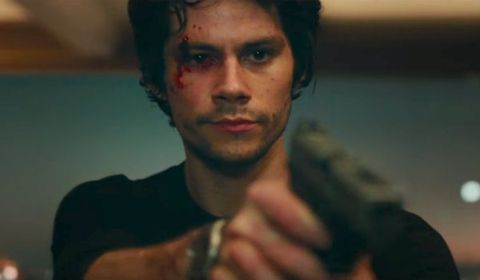The spy genre has become well-worn territory over the years, and Hollywood has shown an increasing willingness to experiment and try new things. From the slow-burn political intrigue of the Jack Ryan films to the fast-paced action adventures of Jason Bourne, as well as the immensely stylish 1980s love letter of Atomic Blonde, there's no shortage of what silver screen espionage can accomplish. Michael Cuesta's American Assassin is the latest attempt to bring a literary spy to life on the silver screen, and while the film impresses on a technical and performance level, its emotionally hollow story makes it a fairly unmemorable (albeit often intense) ride.
Based on the late Vince Flynn's novel series, American Assassin opens on Mitch Rapp (Dylan O'Brien) in a dream that quickly turns into a nightmare. Vacationing with his girlfriend (and eventual fiancé) in a tropical paradise, their seemingly perfect getaway is interrupted by an organized mass shooting by a group of fanatical terrorists. Picking up 18 months later, we find Mitch as a broken and obsessed man -- having fashioned himself into a living weapon to go after the terrorists who killed the love of his life. This obsession eventually gets the attention of CIA agent Irene Kennedy (Sanaa Lathan), who recruits Rapp into the agency and puts him under the tutelage of the legendary Stan Hurley (Michael Keaton). Rapp shows great promise as one of Hurley's newest prodigies, but he soon finds himself put to the ultimate test as he and Hurley go up against Ghost (a forgettable Taylor Kitsch) -- one of Hurley's former prodigies, and a mercenary bent on detonating a rogue nuclear weapon.
Equal parts The Bourne Identity and The Punisher, American Assassin is an unflinchingly brutal look into the mentality of a shattered man finding a way to cope with violence through more violence. However, the problem with the film's depiction of Mitch Rapp is that it seldom takes the time to question his actions or his attitude. Dylan O'Brien definitely brings his A-game to the movie (in the action sequences, as well as the quieter and more dramatic moments), but he does not get much to chew on in terms of the nuances of violence or the man that Rapp eventually becomes. Because of this lack of focus on character, Rapp typically feels rough and abrasive in a way that doesn't feel earned.
It's not that the film is unaware of these ideas, as Michael Keaton's Stan Hurley even utters a quote about the fine line between killing out of a sense of patriotism and killing because it is fun. But the film itself never really dives into that idea in a meaningful way. Rapp is simply right a little too often, and the film never stops to make him question whom he has turned himself into. There's clearly meant to be a juxtaposition between Rapp and Ghost as the story builds to a showdown, but American Assassin shies away from asking hard questions about the irony that Rapp's anti-terrorist training sends him up against another American, rather than the Middle East-based extremists that he prepared to fight.
In that regard, it needs to be said that I have seldom seen a movie go off the rails after the first act quite as drastically as American Assassin. The opening few minutes of the film set up a legitimately compelling character study about a man hell-bent on revenge, but it takes that idea off of the table as quickly as it establishes it. As a result, instead of a story with real personal stakes that the audience can invest in, we're left with yet another globetrotting tale of good guys trying to stop bad guys from doing something bad -- with a series of unnecessary double and triple crosses shoehorned into an otherwise straightforward plot.
Luckily, American Assassin definitely impresses as far as technical filmmaking goes. The action sequences are smooth, brutal, and intense, and it is clear that Dylan O'Brien commits to every single scene -- which is something that he previously proved with his work on The Maze Runner films. In a post-Bourne era of rapid-fire action editing, American Assassin commendably keeps the camera rolling for surprisingly long takes (particularly the heartbreakingly plausible opening attack) as it shows off just how fast and agile its lead actor is. If American Assassin does nothing else during its time in theaters, it should help Hollywood figure out that O'Brien is far better suited for intense action movie roles than we had previously given him credit for.
Beyond that, Dylan O'Brien and Michael Keaton are a good combination -- matching machismo and intensity whenever American Assassin allows them to. They don't have much in the way of traditional chemistry, but they're also not supposed to, as Rapp and Hurley really don't like each other all that much. The film works best when it puts them in a room together and forgets almost everything else, but it does not do that nearly enough as the plot constantly jumps around the globe and seldom gives them time to get to know each other.
Light on plot but heavy on action, American Assassin is mostly forgettable but works well enough when it focuses on the dynamic between Michael Keaton and Dylan O'Brien. They bring all of their established skill and commitment to the film, but it's not enough to elevate the project above a run-of-the-mill spy thriller when everything else and everyone else seems to run on autopilot.
Originally from Connecticut, Conner grew up in San Diego and graduated from Chapman University in 2014. He now lives in Los Angeles working in and around the entertainment industry and can mostly be found binging horror movies and chugging coffee.
Most Popular






